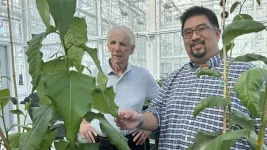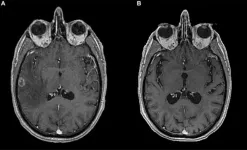(Press-News.org) EMBARGOED FOR RELEASE UNTIL 2 P.M. EDT ON FRIDAY, OCT. 18
Trees are the most abundant natural resource living on Earth’s land masses, and North Carolina State University scientists and engineers are making headway in finding ways to use them as sustainable, environmentally benign alternatives to producing industrial chemicals from petroleum.
Lignin, a polymer that makes trees rigid and resistant to degradation, has proven problematic. Now those NC State researchers know why: They’ve identified the specific molecular property of lignin — its methoxy content — that determines just how hard, or easy, it would be to use microbial fermentation to turn trees and other plants into industrial chemicals.
The findings put us a step closer to making industrial chemicals from trees as an economically and environmentally sustainable alternative to chemicals derived from petroleum, said Robert Kelly, the corresponding author of a paper in the journal Science Advances detailing the discovery.
Kelly’s group previously proved that certain extreme thermophilic bacteria, which thrive in places such as Yellowstone National Park hot springs, can degrade the cellulose in trees — but “not to a great extent,” he said. “In other words, not at the level that would make economic and environmental sense for producing industrial chemicals.”
As Kelly explained, “It turns out that there’s more than just low lignin at play.”
To get around the high lignin problem with trees, Kelly, the director of NC State’s Biotechnology Program and Alcoa Professor in the Department of Chemical and Biomolecular Engineering, has been working for over 10 years with Associate Professor Jack Wang, the head of the Forest Biotechnology Program in NC State’s College of Natural Resources. Wang is also a faculty member with the N.C. Plant Sciences Initiative.
As reported in the journal Science in 2023, Wang and his colleagues used CRISPR genome editing technology to create poplar trees with modified lignin content and composition. They have focused on poplar trees because they are fast growing, require minimal use of pesticides and grow on marginal lands that are hard to grow food crops on.
Kelly’s group found that some, but not all, of these CRISPR-edited trees worked well for microbial degradation and fermentation. As his former Ph.D. student Ryan Bing explained, it turns out that these bacteria have different appetites for different types of plants.
“We can harness the ability of certain thermophilic bacteria from hot springs in places like Yellowstone National Park to eat the plant matter and convert it to products of interest. However, these bacteria have varying appetites for different types of plants,” said Bing, who now works as senior metabolic engineer for Capra Biosciences in Sterling, Virginia.
“The question was why? What makes one plant better than the next?” he explained. “We found an answer to this by looking at how these bacteria eat plant matter of various compositions.”
In a follow-up study, Kelly and Bing tested how well a genetically engineered bacterium originally isolated from hot springs in Kamchutka, Russia, Anaerocellum bescii, broke down Wang’s engineered poplar trees with markedly different lignin contents and composition.
The researchers found that the lower the tree’s lignin methoxy content was, the more degradable it was.
“This cleared up the mystery of why lower lignin alone is not the key — the devil was in the details,” Kelly said. “Low methoxy content likely makes the cellulose more available to the bacteria.”
Wang had created the low-lignin poplars to be better for papermaking and other fiber products, but the recent research suggests that engineered poplars that have not just low lignin but also low methoxy content are best for making chemicals through microbial fermentation.
Wang’s engineered poplars grow well in the greenhouse, but results aren’t in yet from field testing. Kelly’s group has previously shown that low lignin poplar trees can be converted to industrial chemicals, such as acetone and hydrogen gas, with favorable economic outcomes as well as low environmental impact.
If these trees hold up in the field and “if we keep working on our end,” Kelly said, “we will have microbes that make large amounts of chemicals from poplar trees, now that we know the marker to look for — the methoxy content.”
This gives researchers, like Wang, a specific target for producing poplar lines best suited for chemical production. Wang and colleagues have recently initiated field trials of advanced lignin modified poplar trees to address this question.
Right now, making chemicals from trees is doable by traditional means — chopping the wood into smaller pieces and then using chemicals and enzymes to pretreat it for further processing.
Using engineered microbes to break down lignin offers advantages, including lower energy requirements and lower environmental impact, Kelly said.
Enzymes can be used to break down cellulose into simple sugars, but they continually need to be added to the process. Certain microorganisms, on the other hand, continually produce the key enzymes that make the microbial process more economical, he said.
“They also can do a much better job than enzymes and chemicals,” Kelly added. “They not only break down the cellulose but also ferment it to products, such as ethanol – all in one step.
“The high temperatures that these bacteria grow at also avoid the need to work under sterile conditions, as you would need to do with less thermophilic microorganisms to avoid contamination,” he added. “This means that the process for turning trees into chemicals can operate like a conventional industrial process, making it more likely to be adopted.”
Daniel Sulis, another author on the Science Advances paper and a postdoctoral researcher in Wang’s lab, said that environmental disasters fueled by climate change highlight the urgent need to conduct research that finds ways to reduce dependence on fossil fuels.
“One promising solution lies in harnessing trees to meet society's needs for chemicals, fuels and other bio-based products while safeguarding both the planet and human well-being,” Sulis added.
“These findings not only move the field forward but also lay the groundwork for further innovations in using trees for sustainable bio-based applications.”
-shore-
Note to editors: The paper's abstract follows.
“Beyond low lignin: Identifying the primary barrier to plant biomass conversion by fermentative bacteria”
Authors: Ryan G. Bing, Daniel B. Sulis, Morgan J. Carey, Mohamad J. H. Manesh, Kathryne C. Ford, Christopher T. Straub , Tunyaboon Laemthong, Benjamin H. Alexander and Daniel J. Willard, NC State University; Xiao Jiang, University of Georgia; and Chenmin Yang, Jack P. Wang, Michael W.W. Adams, and Robert M. Kelly, NC State University
Published: Oct. 18, 2024 in Science Advances
DOI: 10.1126/sciadv.adq4941
Abstract: Renewable alternatives for nonelectrifiable fossil-derived chemicals are needed and plant matter, the most abundant biomass on earth, provide an ideal feedstock. However, the heterogeneous polymeric composition of lignocellulose makes conversion difficult. Lignin presents a formidable barrier to fermentation of nonpretreated biomass. Extensive chemical and enzymatic treatments can liberate fermentable carbohydrates from plant biomass, but microbial routes offer many advantages, including concomitant conversion to industrial chemicals. Here, testing of lignin content of non-pretreated biomass using the cellulolytic thermophilic bacterium, Anaerocellum bescii, revealed that the primary microbial degradation barrier relates to methoxy substitutions in lignin. This contrasts with optimal lignin composition for chemical pretreatment that favors high S/G ratio and low H lignin. Genetically modified poplar trees with diverse lignin compositions confirm these findings. In addition, poplar trees with low methoxy content achieve industrially relevant levels of microbial solubilization without any pretreatments and with no impact on tree fitness in greenhouse.
END
Finding could help turn trees into affordable, greener industrial chemicals
2024-10-18
ELSE PRESS RELEASES FROM THIS DATE:
UTA to host discussion on Texas energy needs
2024-10-18
The University of Texas at Arlington will host GridNEXT DFW 2024: Meeting the Demand, an event dedicated to envisioning the future of energy infrastructure, on Oct. 25 from 9 a.m. to 3 p.m.
The one-day seminar will bring together industry partners, leaders, government officials and private stakeholders across the Texas energy space to discuss growing power needs and how to better support the Texas power grid.
It will be held at UTA’s Rio Grande Ballroom, 300 W. First St. in Arlington. Woody Rickerson, ERCOT senior vice ...
Preventive medicine professors part of collaborative grant for AI system to enhance Alzheimer's caregiving
2024-10-18
Jennifer Martindale-Adams, EdD, and Linda Nichols, PhD, professors in the Department of Preventive Medicine in the College of Medicine at the University of Tennessee Health Science Center, are members of a team led by Xiaopeng Zhao, PhD, professor in the Department of Mechanical, Aerospace, and Biomedical Engineering at the University of Tennessee, Knoxville, that was recently awarded $401,090 grant from the National Institute on Aging for the development of the RISE project, “Robot-based Information and Support to Enhance Alzheimer’s Caregiver ...
Tropical mammals react to changes in lunar light
2024-10-18
The full moon has a bad reputation for bringing out the worst in people, from werewolves to lunatics. However, it turns out that the lunar cycle can impact behavior – at least in tropical mammals.
New research appearing in the Proceedings of the Royal Society B reveals that half of the mammal species in tropical forests adjust their behaviors in response to the moon's phases and corresponding variations in light.
By Caleb Hess, Cathrine Glosli
Michigan State University ecologist Lydia Beaudrot, who studies tropical ecology and conservation, was among the international cohort of researchers who contributed to the study. ...
Pennington Biomedical’s EAT2 study to explore unknown effects of weight fluctuations
2024-10-18
Dr. Ursula White, an associate professor of Clinical Science at Pennington Biomedical Research Center, is taking a deep dive into the lasting health effects of short-term weight gain and weight loss. The ability for the fat tissue to expand or contract to accommodate changes in body weight is important for sustained health. Dr. White’s clinical study at Pennington Biomedical, the EAT2 study, will allow her to explore how changes within the adipose tissue are affected by weight gain and weight loss, and what that means for a person’s health.
The EAT2 study is recruiting participants now, and participants will be randomly assigned ...
Butterfly brains reveal the tweaks required for cognitive innovation
2024-10-18
A species of tropical butterfly with unusually expanded brain structures display a fascinating mosaic pattern of neural expansion linked to a cognitive innovation.
The study, published today in Current Biology, investigates the neural foundations of behavioural innovation in Heliconius butterflies, the only genus known to feed on both nectar and pollen. As part of this behaviour, they demonstrate a remarkable ability to learn and remember spatial information about their food sources—skills previously connected to the expansion of a brain structure called the mushroom bodies, responsible for learning and memory.
Lead author Dr Max ...
Time to sustained recovery among outpatients with COVID-19 receiving montelukast vs placebo
2024-10-18
About The Study: In this randomized clinical trial of outpatients with mild to moderate COVID-19, treatment with montelukast did not reduce duration of COVID-19 symptoms. These findings do not support the use of montelukast for the treatment of mild to moderate COVID-19.
Corresponding Author: To contact the corresponding author, Susanna Naggie, MD, MHS, email susanna.naggie@duke.edu.
To access the embargoed study: Visit our For The Media website at this link https://media.jamanetwork.com/
(doi:10.1001/jamanetworkopen.2024.39332)
Editor’s Note: Please see the article for additional information, including other authors, author ...
Drones prove effective way to monitor maize re-growth, researchers report
2024-10-18
Maize, or corn, grows tall, with thin stalks that boast ears of the cereal grain used in food production, trade and security globally. However, due to rain, wind and other increasingly extreme weather events, the maize falls down, risking the entire crop. Called lodging, the physical fall results in shorter plants and overlapping leaves — both of which negatively impact the plant’s ability to grow.
Conventional lodging prevention and mitigation requires many agricultural technicians significant time to investigate the crop fields, according to a team of researchers based in China. They ...
Materials of the future can be extracted from wastewater
2024-10-18
"The perspective is enormous, because you’re taking something that is currently waste and making high-value products from it."
This is what Professor Per Halkjær Nielsen, Department of Chemistry and Bioscience at Aalborg University in Denmark, says about the results of a research project that utilizes surplus biomass in wastewater treatment plants in new ways. The focal point is biopolymers that can be described as long chains of molecules that are bound to each other and that are produced by living organisms, including bacteria. Today, synthetic ...
Long-lasting immunotherapy response in stage IV lung cancer with brain metastasis
2024-10-18
“In the last decade, immunotherapy agents changed the treatment landscape for Non-Small Cell Lung Cancer (NSCLC).”
BUFFALO, NY - October 18, 2024 – A new case report was published in Oncoscience (Volume 11) on October 8, 2024, entitled, “Complete and long-lasting response to immunotherapy in a stage IV non-small cell lung cancer with brain metastasis.”
As highlighted in the abstract of this report, approximately 20% of lung cancer patients have brain metastases at diagnosis, which is associated with a worse prognosis and negatively impacts quality ...
American lobster population, habitat preferences shifting, study finds
2024-10-18
American lobsters along Maine’s coast have relocated to new habitats, while the population simultaneously shrunk in abundance and grew older, according to a new study by University of Maine researchers.
For decades, the vast majority of adult lobsters resided in boulder shelter habitats. This knowledge helped inform longtime conservation efforts and regulations within the more than $740 million fishery.
A team of UMaine scientists, however, found that from 1995-2021, occupancy of boulder habitats dropped 60%. Meanwhile, the number ...







